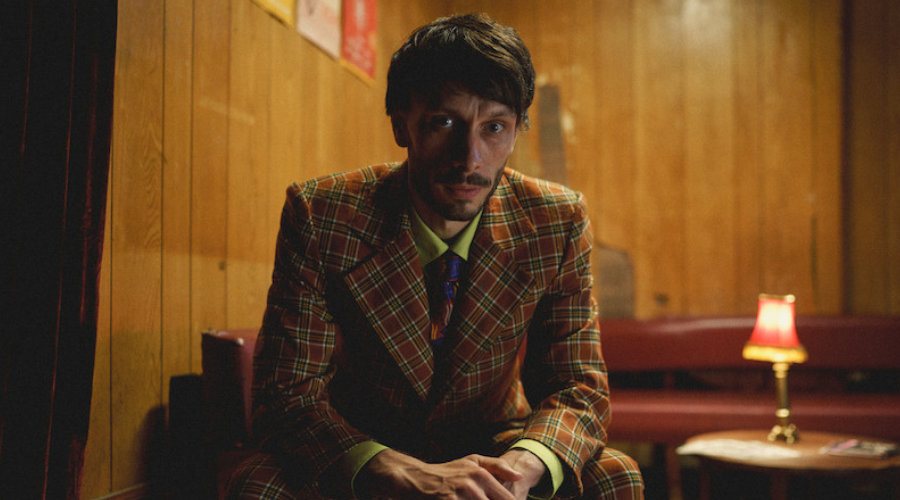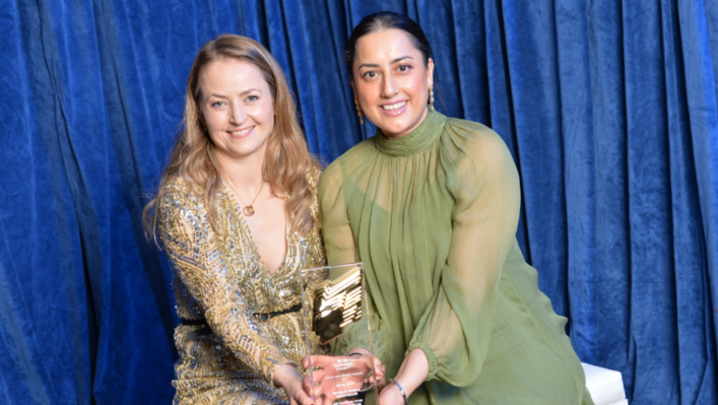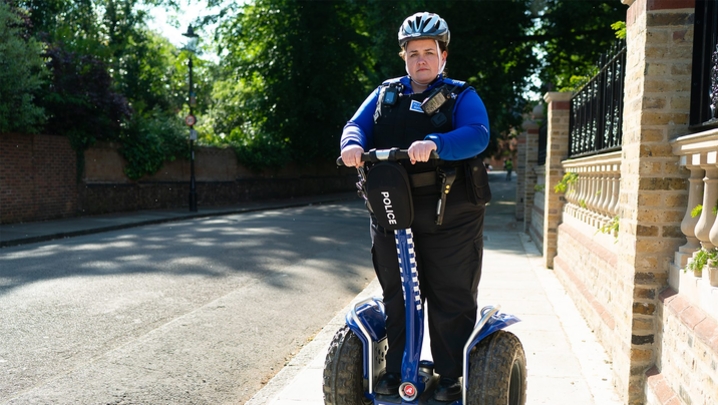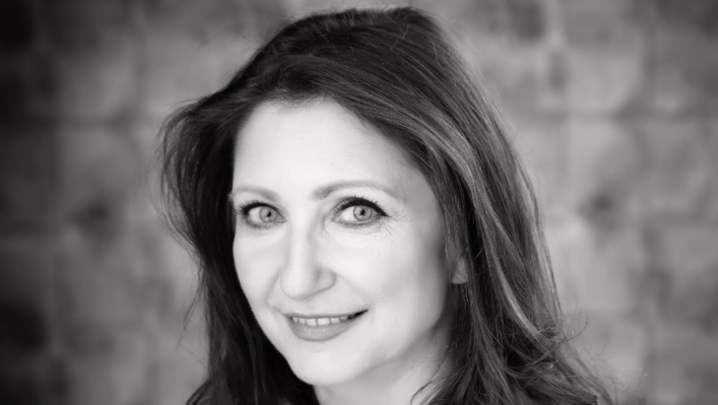Just when you think Richard Gadd has told you everything, Baby Reindeer gets bleaker. He doesn’t bare his soul so much as exorcise it, leaving you with such a vivid picture of pain and self-loathing that it makes your ribcage tighten.
It might be surprising, then, that one of its editors’ other work is positively whimsical. Mike Holliday’s CV includes considerably lighter-hearted shows, among them Horrible Histories and Ghosts. Sure, Baby Reindeer is also a comedy – when it wants to be – but it’s hard to imagine Donny Dunn ranting on CBBC. However, Holliday was hired because of, not despite this experience.
“It wasn’t drama they were looking for in my background: it was comedy,” he tells me. “That side is considered harder.”
He’s quick to add that he doesn’t necessarily agree, at which point the show’s other two editors cut in to insist that, no no no, it is.
“It’s easier to make people cry than laugh,” Peter Oliver says. “You have to treat each joke differently.”
Oliver and Benjamin Gerstein join Holliday on Zoom, making up a trio that assembled what went on to become one of the biggest shows of the year. They wear it lightly, clearly enjoying the opportunity to chat with each other and catch their breath.
“I think that it was great that we didn’t know how successful it was going to be,” Oliver laughs. “We’d have been paralysed: ‘what if they don’t like this, what if they don’t like this?’”
Instead, he explains, “we had the freedom to cut as we wanted to.”
Holding on an awkward moment – like Dunn waiting for the microwave to finish during a wake – took a joke from uncomfortable to excruciating. Conversely, showing less, rather than more, of the show’s unflinching depiction of sexual violence heightened its impact.
“The audience thinks about it and feels it a lot more,” says Gerstein.
Gadd himself was heavily involved in the editing process. During post-production, you could often catch him in the corridor outside the edit suite, rerecording bits of voiceover to get the intonation just right. Some parts were even rewritten on the fly: something said in two lines might be chopped down to one, for example. Other times, Gadd was called upon to come up with new jokes entirely.
“He’s a really fast, really good writer,” Gerstein says. “He’ll just stand there and come up with them.’”
“It’s very brave to stand up in front of seven or eight people and go ‘what about this? Oh, that’s not funny’.”
“That was really exciting, to have that creativity right there in the room with you,” Gerstein continues.
“He wasn’t precious: some writers are kind of like ‘don’t change a thing’,” Oliver agrees. “It was really fun to work with someone who’s a team player.”
Another key collaborator in the edit was Weronika Tofilska, director of the first four episodes. As you might expect from someone who also co-wrote Love Lies Bleeding – a Kristen Stewart-helmed triumph in weird cinema – Tofilska’s vision for Baby Reindeer was uncompromising.
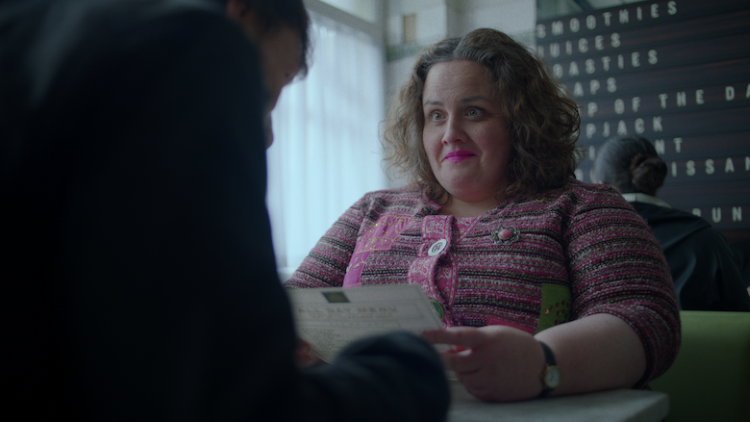
“[Gadd and Tofilska] were less bothered about viewing figures: they just wanted to make the story they wanted to make, and then everyone fitted into that,” Oliver tells me. “That’s part of how we were able to uniquely cut it.”
Take the scene in episode six where Dunn breaks down onstage and starts telling the audience the whole ordeal of his stalking.
“I did about nine versions of that,” Holliday says. “I did one where it’s one shot, I did one where we had more audience involved and we watched them all and were like ‘okay, that’s the normal television version, but this isn’t a normal television show’.”
“So Josephine [Bornebusch, the director for the last three episodes] and I then unwound all the bolts and let it all breathe. [The lengthier version] was much closer to the script than the versions that we’d done.”
That the audience are trapped with Dunn for much, much longer than they’d like perfectly captures what it’s like in the struggling comic’s head. We don’t want to be here, and neither does he. Nevertheless, the slow-motion implosion of his life continues, with him armed only with neuroticism rather than introspection, self-hatred instead of self-esteem. The longer Dunn stands onstage, the more hopeless things seem.
It's tough enough watching it once. Imagine editing it.
“It doesn’t really impact you emotionally until later,” Gerstein explains, “even though you’re trying to make yourself available to say ‘how will this feel?’”
Even when you’re not dealing with material this heavy, the job of an editor can be more psychological than people realise.
“You have all these opinions coming at you from different areas,” Holliday says. “You have to bring all these ideas into one space without undermining the script, or the director, or the execs, or the channel.”
“You get all the cards on the table, smoosh them together and find the actual direction you’re gonna go, and make it look easy while you’re doing it and talking about what you’re doing.”
“When people are coming up in the industry and they want to be editors, they don’t realise it isn’t just editing,” Holliday continues, adding with a grin, “I don’t think I turned round in the chair in my first six years: I think I stared at my screen and didn’t realise I had to deal with people behind me.”
This isn’t something that gets taught at film school, according to Gerstein (a former David Lean scholar at the National Film and Television School). What does help, though, is the savagery of other student editors.
“You just take each other’s work apart continuously,” he says. “I’ve never had a screening as hard as it was at film school, ever.”
In the industry at large, things are a bit more easy going.
“Loads of filmmakers love coming into the edit room,” says Gerstein, “because they really get their hands on it – the director, the writer – and get to really feel it being put together.”
That contagious creative joy can’t even be dampened by a show as vantablack as Baby Reindeer.
“Someone said to me ‘how can you work on something so dark?’, and I was like ‘we kind of made it dark’,” laughs Oliver. “It’s a tick for us that it’s so emotionally affecting on people, because that’s what we were aiming for.”
Peter Oliver, Mike Holliday and Benjamin Gerstein were nominated in the Editing – Scripted category at the RTS Craft & Design Awards 2024

